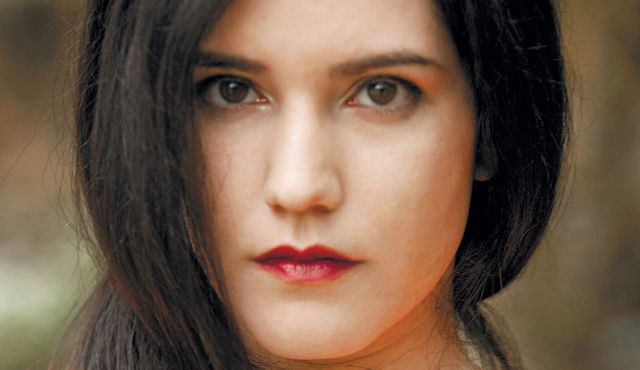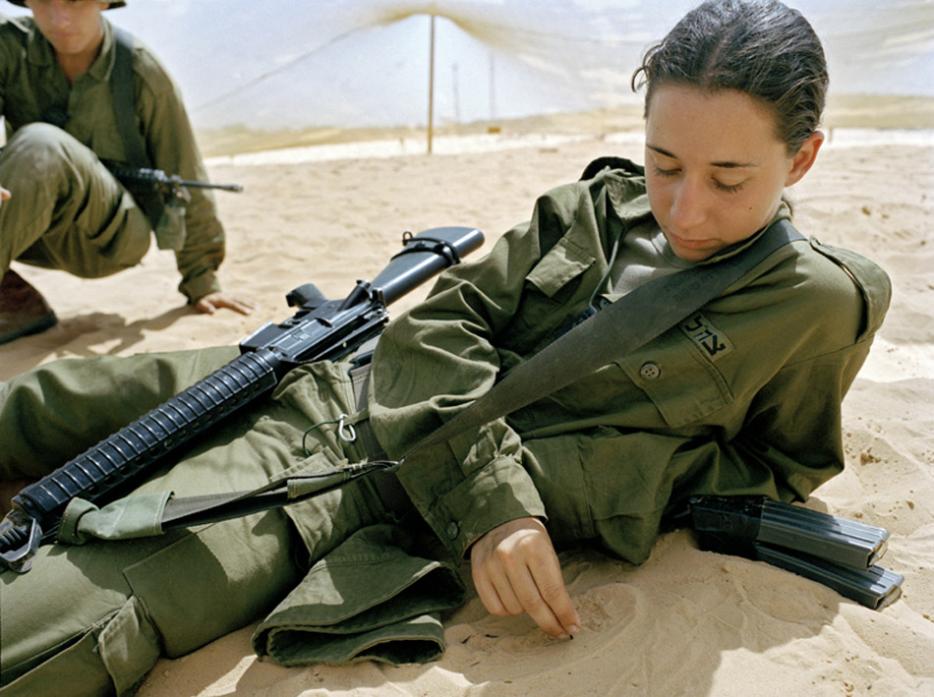Sabra: an American brand of hummus; a spiky, succulent cactus known to grow in Israel; and the quasi-affectionate name given to Israeli Jews—the ones who came of age there, who did their service in the IDF, who teach artless Canadians how to say Kus emek11“Your mother’s pussy,” a popular Hebrew and Arabic curse. with just the right tremor of frustration.
I remembered these definitions of “sabra” as I read The People of Forever Are Not Afraid, the debut novel by 26-year-old Israeli writer Shani Boianjiu. Israeli Jews, hardened from years of living in one of the most contested pieces of land in the world, are known for being aggressively prickly on the outside, but tartly juicy on the inside, like that desert plant.
This quality is apparent in Boianjiu’s prose—blunt and funny, delivering a one-two kick of sting and sweetness. The novel features three friends from the same village near the Lebanese border, each chapter a chronicle of their mini-diaspora as they come of age while working at checkpoints, training soldiers to shoot, or standing guard in front of a computer monitor. There is nothing remotely whimsical about these girls, who are unabashed bitches more often than not. Within that, the boredom of mandated military service—that ambivalence in the midst of war—becomes completely accessible, as stultifying and violent as friendship between three furious teenage girls ever was.
Boianjiu, who was a weapons instructor before studying English and Social Anthropology at Harvard, is the perfect expression of that dichotomy—forthright and serious in her opinions, and then dissolving in giggles as she quotes a YouTube video. She dreams of the perfect sandwich, but knows how to shoot someone in the heart.

The People of Forever Are Not Afraid, the title of your book, refers to a bumper sticker that one of the characters sees. Is that a phrase that exists? I’ve never heard it before.
The bumper sticker is Am aha nessah [Note: approximate phonetic spelling]. In Hebrew, am can be translated as nation, but that didn’t feel quite right. I think of it as the people. I wanted the translation of that phrase to sound in English the way it would sound to a Hebrew speaker, but it’s not going to be one-to-one because the languages aren’t one-to-one. What does it mean, nessah? To me, nessah doesn’t mean so much eternity. For me, a secular Hebrew speaker hears forever and it relates more closely to that in English to me. So it’s a translation to the best of my capabilities.
It’s an adaptation rather than a strict translation.
I wrote it in English, but in many ways I was illuminating more about the mindset of the Hebrew speaker than I could have had I written it in Hebrew originally. I was always navigating between the two languages.
Was there a reason you decided to write it that way?
It wasn’t something that I thought about constantly when I started, but it ended up happening. All those times I’d read an article in the newspaper—which happens a lot to an Israeli living abroad—in the English-speaking world press, I’d see the way that certain words or phrases get translated, and it just wasn’t the right language to explain what was really meant. If the language was translated just a bit differently, maybe the situation could be understood better by the world. In many ways, this book was a chance to give my point of view on things in Israel, and the language was certainly one way for me to do that.
Something about the pacing of the sentences made me realize that I was reading in the voice of someone thinking and speaking in Hebrew.
I read at a JCC event in New Jersey and people kept saying “I think you translated it wrong.” There are all these assumptions about language, what it should be, or what it has to be, that I find so funny. Particularly when it involves translation, you find out that there is no authority—that the authority was the first person that reported on a certain situation. For example, before the Gaza withdrawal program started, I bet they had to sit and be like, “How are we going to call that in English. Are we going to call it withdrawal, or the pullout plan, or the disengagement plan?” They could’ve chosen one of 30 or 40 English words to describe [what was happening], and eventually one of those words would become associated with that program in the minds of North American English speakers.
A lot of times, particularly when it comes to the Palestinian-Israeli conflict or the Middle East in general, the people who get to decide that are journalists, who are working on deadlines, who are not artists. Their main concern is not necessarily the human lives of people, always. Reporting is more about getting at the factual truth, and I don’t think those are necessarily the conventions that a novelist should live by.
When you were at college in Boston, did you find that reading about what was happening in the Middle East felt different then when you were living in Israel?
The U.S. is really interesting—but I have to caveat that by saying that I was at Harvard, which is a very sheltered, closed community. I think that there’s a tendency in North America to compare things, so if you think that a solution works in Place A then it would work in Place B. I recently was working on a deadline and doing the least productive thing ever, which is just surfing the web, and I found this montage of all the movie clips where characters say “We’re not so different, you and I.” There’s something very comforting in fiction and in film—comforting and commercial—in that political message. You could bottle that up and sell it to people. But it was extremely frustrating when I would try to explain to people how certain situations were different, and there was just very little openness to hearing the experiences of people who had actually been there and lived it.
So your perspective was seen as less legitimate?
It was sort of assumed that because you had the experience, your knowledge was tainted. Tainted and biased. I really do believe that if there ever is a peace agreement it would be largely due to the efforts of people in the global community, but all these initiatives that were all about bringing Jews and Arabs to sit down and have coffee with one another—I found them to be very condescending. I grew up in the Western Galilee, and my town is in a predominantly Arab section. All of the stores where I shop, all of the bars where I hang out at night—they’re all in Arab towns. ALL of the coffee that I’ve ever had was with Arabs, so I don’t need initiatives!
When you finished your service, was it important to leave Israel? Did you want to have some distance from where you originated?
I left for the U.S. right after I finished my military service. [Quizzically] I don’t quite know why I did that. I live the sort of life where things happen to me and I don’t think them through, although I’m trying to change that. A lot of times we give reasons for our actions in retrospect, but I still don’t know why I did that.
When I was in Israel, one of the things that I found so startling was the presence of guns, just seeing soldiers in a mall parking lot with M-16s over their shoulders. What was it like to go from such a specific, militarized environment to its opposite?
Harvard has a huge amount of diversity. There are people with all kinds of interests from all corners of the world, all economic classes and backgrounds. But of course there was culture shock, because I felt like I’d spent two years in an institution learning what it meant to be successful there, what it meant to be respected by my peers and superiors. I wasn’t very successful at the get-goand I wasn’t very successful at it when I finished—and when you think about it in college terms, my service ended after my sophomore year. When I was beginning to figure out how to do well in the army and feel settled, here I was in an entirely new community with its own set of expectations where everything I’d learned about what it meant to be successful meant nothing. I was just another freshman and I had to start all over again. It was jarring.
It’s funny to hear you say that you weren’t the greatest at your job when you were serving, because you were a weapons instructor. I’m not sure I understand how you could be put in that position if you’re not, objectively, especially skilled at it.
One of the things that makes the Israeli army a little different is that there are so many people in it, and a lot of them are not there for the long run, they’re just there for two or three years. The army isn’t looking to make you the best at everything. They just want you to be able to do one thing really well that would probably do you no good outside the context of the army. I felt like I learned everything I needed to know by the end of my two years. I could do it in my sleep.
About marksmanship?
Mostly about how to make other soldiers believe in themselves. That was something I really learned. (Fiercely) I was like, “Why did you guys put me here?” Like, I HAVE NO PEOPLE SKILLS. By the end of it, I had my own unique way of getting a person to be better at this particular thing. I couldn’t teach another person how to write a better paper, but I could take someone who was really struggling on the shooting range and quietly talk to him about my own techniques, which were instilled in me by great officers. I do reserve duty from time to time, but outside of that context, no one’s ever going to need that skill from me in real life.
How long do you have to be available as a reserve after you’ve done your mandatory service?
I’m not sure.
Just... forever.
When I was there last time, I was surprised, like, I saw some women and they looked old. They were grown-ass women. I asked them how long they’d been doing it and they were like “Nine years.”
Speaking of the women you served with—I loved the way the three main characters [Yael, Avishag, and Lea] dealt with each other. They talk with this combination of toughness and kindness that is so… not my experience. It’s bracing, the way they treat each other so indelicately, but with love. Is that an Israeli trait? And if so, when you moved to the U.S., did you notice any behavioral differences?
Yeah. There is a different way that women in Israel talk to one another. When I was in the army, I loved observing girls—not necessarily my friends—that were friends with one another, particularly girls who knew each other from back home. Israel is so small that way. I would sit at lunch and watch these girls talk, and like you said, they have such a forceful way of talking to each other. I’ve experienced it to a lesser degree than what I observed—that was really the catalyst for wanting to write about three friends.
From watching these other girls at the table over.
When I was in the IDF, I didn’t have any strong friendships like the ones in the book. I really wanted to imagine something that I didn’t have. I think that’s something a lot of writers do—invent something they didn’t have.
Some of the scenes are so intimate—Yael with her head in Hagar’s lap, having her hair braided, the two of them gossiping about sex and insulting one another: I felt like I learned so much about Israeli culture in that one part.
I don’t want to be a cultural reductionist, like “Israelis are like...” I just think that, well, like, [Israeli President] Shimon Peres just celebrated his 90th birthday. It was kind of ridiculous. Bill Clinton and Barbra Streisand came. In his speech, he said something along the lines of “I love my people, who are very tumultuous, and short-tempered—the same person who could curse you off very passionately if they think you accidentally cut them off while driving would be the same person who would be fighting next to you to save your life on the battlefield.” Maybe it sounds like a cliché, but that’s how I feel about Israelis. That dynamic has been explored by many Israeli writers before me, but what I wanted to do was to explore it in the context of young female friendship, which I feel hasn’t been explored enough. See how that translates—that pattern of cursing each other out, shaming each other for sexual behaviors, and looks, and being silly with one another, but at the same time caring very deeply about each other.
You mention other Israeli writing that explores that dynamic—are you thinking of one particular book or author?
Yoram Kaniuk, who recently passed away [wrote a novella called Nevelot]. Maybe it was translated as Bastards. It’s in two parts, well, it travels back and forth in time. The first part describes a very passionate friendship between two guys, the days when they fought together to establish Israel and blah blah blah. On the one hand, they insult and judge each other, but on the other hand it’s very clear how much love there is.
I just Googled him. Looks like he had a long career.
In interviews, he was always complaining that he didn’t get recognition. American writers, too—a lot of the time they complain about the recognition that they get or don’t get. I feel like it’s an old people thing, or maybe a people-over-30 thing. People of my generation, we never expect to get any recognition. We don’t even expect to have a job!
That’s very much the opposite of the way generations relate to each other in North America, I think. At the very least, the older people tend to think that Millennials are so entitled. That we all have such absurd and unearned expectations for ourselves.
I’m sure [Yoram Kaniuk] thought that young Israelis were entitled too, because the second part of Nevelot is basically these two old men, sitting at a café and watching all the young Israelis be so awful to older people. And then they go on a killing spree to kill all the young people. He’s a great author!
And yet it sounds like he was pathologically unsatisfied.
Later in life he wrote something like “I was born to be dissatisfied.” I don’t know why it mattered so much to him because his books are so full of nuance and understanding of the human condition. Did he really think the world is fair that way? I read all of his books, and I loved him. That’s the definition of a successful author to me. To an Israeli author, working for such a small audience, I don’t know what one could’ve done to make him know that he was appreciated.
Well, you’re kind of… his legacy!
(We laugh.)
After you published the book, did you discuss the stories with friends of yours, or people you may have served with?
No. The book is not out in Hebrew yet. (Weighty pause) I’m not looking forward to that. Not because of what I wrote specifically, but like, the book is fiction. My book is not about one place or one people, even though if you read my reviews it sort of feels like no one actually read the stories as stories. There’s this tendency to see everything that people write—particularly by young women—as gossip. [The book’s Hebrew release] is not something that I particularly look forward to.
There are a lot of very specifically manufactured sandwiches referenced throughout the book. Sandwiches—and it’s hard to say this seriously—seem like a symbol of compassion. In the final chapter, Yael’s mother is responsible for getting hundreds of sandwiches made for the Israeli hostages in Uganda, and less urgently, Lea gets a job at a sandwich kiosk in Tel Aviv called We Don’t Judge, where people are free to order any kind of sandwich they can think of. Is there one sandwich that you wish you could order?
Yes! And I can never get it. I’m in New York City right now, which is the type of place where you’d think you could get any food you want. It would be: good pita bread, meaning the type that doesn’t exist in the US, mayo, an omelette, a good tomato, and green onions. Maybe a little bit of basil, and salt. Simple.
Would it be rolled up in the pita?
No, stuffed. Like a pita pocket.
Ok, I think we’re getting somewhere here. I wish that sandwich place really existed.
I know! If there are any entrepreneurs out there, they should do it.






